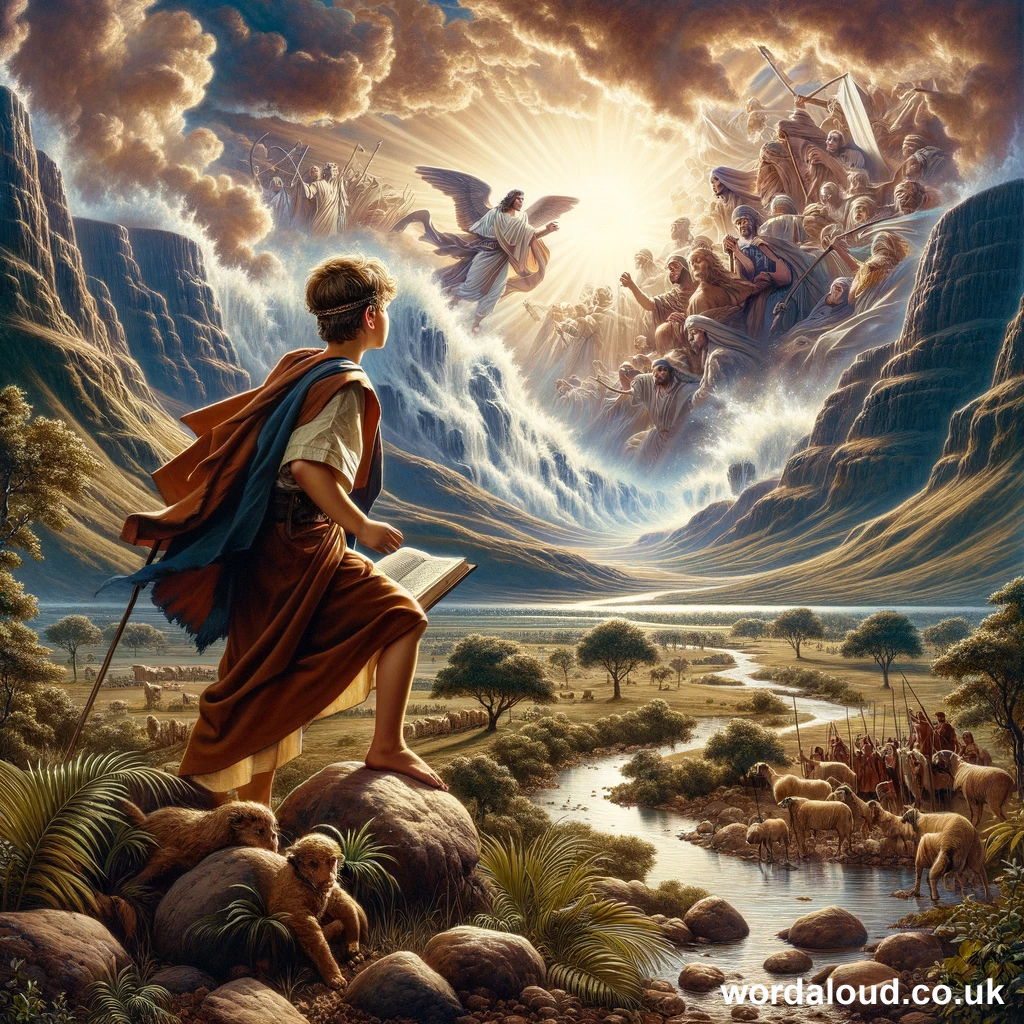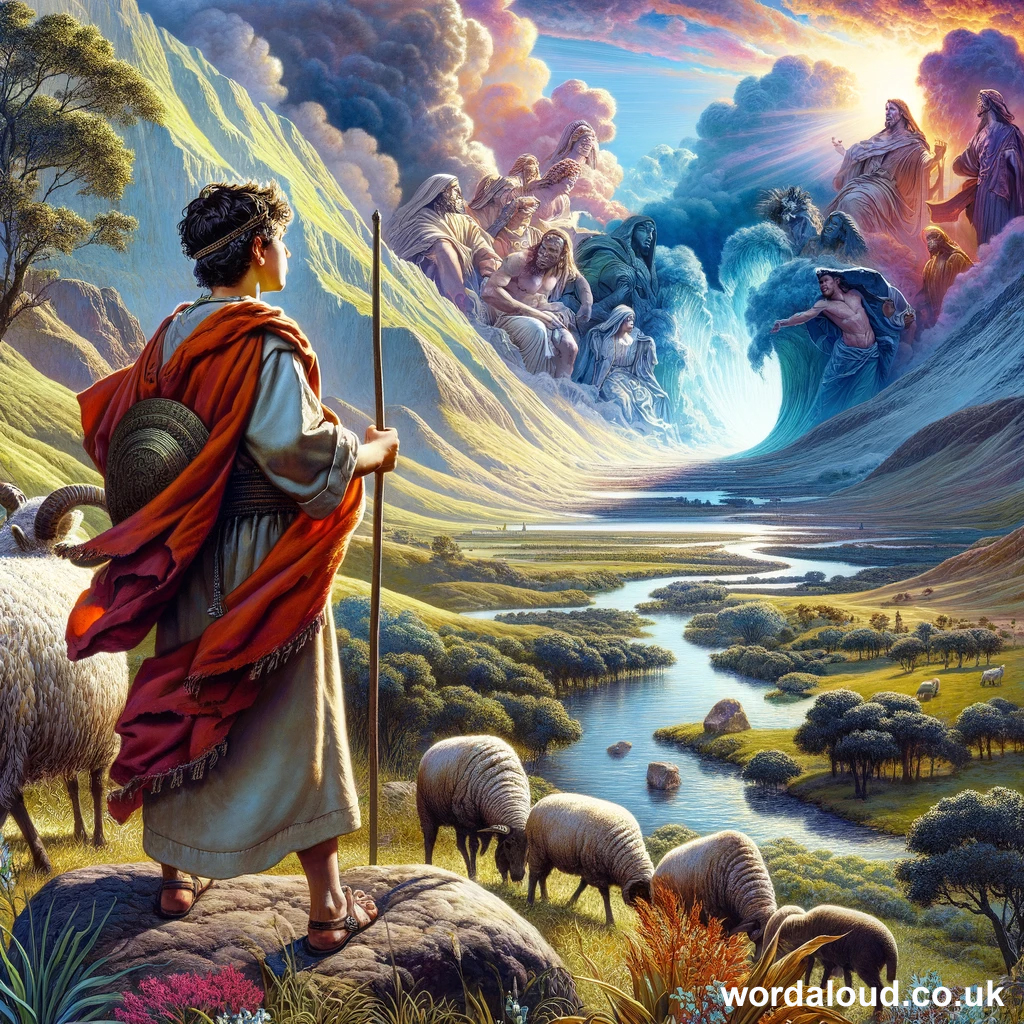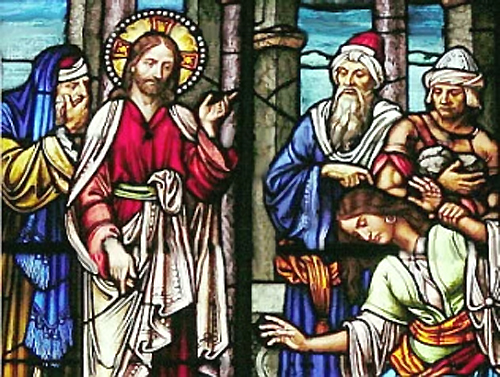Christian Art | Prayer With Jesus | Psalms | God’s Wonders At The Exodus | King David As A Boy | Audio KJV | Love Revealed By Jesus Christ | King James Audio Bible
Psalm 114 | King James Audio Bible
YouTube: Psalm 114 | KJV | King James Version | Audio Bible | Word Aloud
Psalm 114 recounts the Israelites’ journey out of Egypt, focusing on God’s power over natural elements. Psalm 114 describes the sea fleeing, the Jordan River reversing its course, and mountains and hills moving, all in response to God’s presence. These images serve as metaphors for divine intervention during the Exodus. The psalm is traditionally linked with significant events in Jewish history, and its vivid imagery reflects a theme of liberation and divine guidance.
Historical and Cultural Context
Psalm 114 is traditionally believed to have been written after the Israelites’ Exodus from Egypt, a period central to Jewish identity and faith. The Exodus represents not just physical liberation from slavery but also the establishment of a covenant relationship between God and His chosen people. This psalm, like others in the ‘Egyptian Hallel’ collection (Psalms 113-118), is recited during Jewish festivals, particularly Passover, as a remembrance of God’s deliverance.
Literary Structure and Style
The psalm’s literary structure is notable for its concise yet vivid poetic form.
- Imagery And Metaphor: The psalm employs powerful natural imagery to describe the Exodus. The sea’s flight and Jordan’s reversal are metaphors for God’s intervention in nature and history. The mountains and hills skipping like rams and lambs personify nature responding in joyous and awe-struck dance to God’s presence.
- Rhetorical Questions: The psalmist uses rhetorical questions — ‘What ailed thee, O thou sea, that thou fleddest?’ — to emphasize the miraculous nature of the events. These questions invite the reader to ponder the power of God that causes even nature to react in extraordinary ways.
- Parallelism: A key feature of Hebrew poetry, parallelism, is evident in the psalm’s structure. It enhances the poetic rhythm and aids in emphasizing key points. The repetition of actions by different elements of nature (sea, river, mountains, and hills) serves to reinforce the message of God’s dominion over all creation.
- Symbolism: The psalm is rich in symbolic language. The sea and Jordan River symbolize barriers and challenges, while their miraculous parting represents God’s ability to remove obstacles for His people. The mountains and hills symbolize stability and permanence, yet they too are shown as mutable under God’s command.

Theological Themes
- Divine Power And Providence: A central theme of Psalm 114 is the demonstration of God’s power and providential care for His people. The miraculous events during the Exodus serve as a testament to God’s supremacy over nature and His commitment to the covenant.
- Reverence And Awe: The natural world’s response to God’s presence in the psalm evokes a sense of reverence and awe. The psalmist portrays the earth trembling at the presence of the Lord, underlining the appropriate human response to divine majesty.
- God’s Presence Among His People: The psalm reflects on the idea that God dwells among His people. The reference to Judah as God’s sanctuary and Israel as His dominion underscores the belief in God’s abiding presence with the Israelites.
- Transformation And Salvation: The final verses of the psalm speak of transformation — a rock turning into water — symbolizing God’s ability to provide and transform situations. This echoes the salvation theme central to the Exodus story.
Contemporary Relevance
- Inspiration And Hope: The psalm offers inspiration and hope, reminding believers of God’s power to intervene and transform challenging circumstances.
- Ecological And Environmental Message: The depiction of nature in the psalm resonates with contemporary concerns for the environment, highlighting the connection between the divine, humanity, and the natural world.
- Spiritual Reflection: For personal and communal worship, the psalm serves as a profound source for reflection on the nature of God and the appropriate human response to His majesty and grace.

![]()
Psalm 114 | King James Audio Bible
When Israel went out of Egypt, the house of Jacob from a people of strange language;
Judah was his sanctuary, and Israel his dominion.
The sea saw it, and fled: Jordan was driven back.
The mountains skipped like rams, and the little hills like lambs.
What ailed thee, O thou sea, that thou fleddest? thou Jordan, that thou wast driven back?
Ye mountains, that ye skipped like rams; and ye little hills, like lambs?
Tremble, thou earth, at the presence of the Lord, at the presence of the God of Jacob;
Which turned the rock into a standing water, the flint into a fountain of waters.
Psalm 114 | King James Audio Bible
- Divine Power And Intervention: The psalm illustrates the immense power of God, particularly highlighted through the miraculous events of the Exodus.
- Authority Over Nature: The psalm reflects on God’s supreme authority over natural elements, demonstrated in events like the parting of the Red Sea and the Jordan River.
- Commemoration Of The Exodus: The psalm celebrates the deliverance of the Israelites from Egypt, marking a pivotal event in Jewish history and identity.
- Response Of Nature To The Divine: Nature is personified to depict the reaction of mountains, hills, seas, and rivers to God’s presence, emphasizing the awe-inspiring power of the divine.
- Reverence And Awe Towards God: The psalm stresses the need for human reverence and awe in response to God’s mighty acts and presence.
- God’s Presence With His People: The psalm highlights the belief in God’s dwelling among the Israelites, with specific mention of Judah as His sanctuary and Israel as His domain.
- Miraculous Provision And Care: The psalm depicts the transformation of a rock into a water source, symbolizing God’s ability to provide miraculously for His people.
- Theological Contemplation: The psalm encourages deep reflection on the role of God in historical events and in the lives of His followers.
![]()








